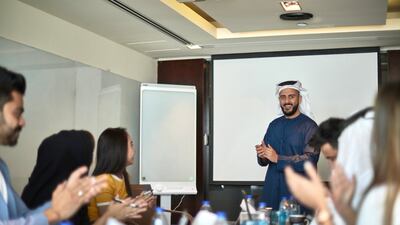Here is a fact to mull over: almost 50 per cent of undergraduate students in the UAE belong to business families but only 22 per cent of them are willing to join and lead their family businesses, as per a recent report titled Next Generation Succession Intention in the UAE.
This leads one to wonder if the education system is doing enough to train undergraduate students to take on leadership roles in the companies, the charge of which could be passed down to them eventually.
The report on the next generation – by the Sheikh Saoud bin Khalid bin Khalid Al Qassimi Chair in Family Business at American University of Sharjah and the Family Business Council Gulf – challenges our understanding of why undergraduate students do not see themselves developing a successful career in their family businesses. These are companies in which two or more family members own and/or manage the firm.
For decades, following the international trend, management education in the UAE has focused on developing undergraduates' skills and capabilities to be employed in organisations where owners are different from the managers. However, the 2008 global financial crisis challenged this traditional educational pattern in the UAE and incorporated in education an entrepreneurial-oriented perspective.
The UAE government has sought to lay the foundations to develop a resilient economy by shifting from the resource-based economic model into a knowledge-based-entrepreneurial one.
However, an entrepreneurial education is not enough to address future challenges. In a country like the UAE, family businesses play an important role in generating and preserving wealth. It is estimated that more than $1 trillion in private wealth is going to pass from one generation to another in the Gulf region in the coming decades. But what about the non-economic wealth, such as the tacit business knowledge that is passed down from parents to children? This includes social networks – relationships that are crucial for business growth, and the emotional endowment that business families invest in their firms, embracing legacy, recognition and family identification.
The effort to develop an entrepreneurial mindset among the country's youth via an entrepreneurial education is necessary and important to develop a diversified and dynamic economy.
The fact is that family businesses matters. Here in the UAE, they are legacy institutions. Big family conglomerates such as Al Futtaim Group, Al Ghurair Group, or Easa Saleh Al Gurg co-exist with small and medium firms such as Suwaidi Pearls and create a unique ecosystem in the country.
A comprehensive understanding of this ecosystem is required to speed up the economic and social transformation and to achieve a knowledge-and entrepreneurial-based economy.

In this context, an education in family business is necessary to preserve and expand the current economic, social, emotional wealth across generations. Competitive firms require cohesive and happy families.
Almost 50 per cent of the undergraduate students in the UAE belong to business families and this percentage increases to 80 per cent for Emirati undergraduate students. Most of them will assume responsibilities as owners, managers, or board of directors or as wealth managers, board members of the business council, or as family philanthropists.
Increasingly, undergraduate students who do not belong to business families, are nonetheless going to go work for family businesses and their professional careers are going to be developed within the boundaries of those businesses. Even if one day some of them create their own companies, it is most probable that support by way of financial, human and emotional assistance will come from their families.
But despite the importance of family businesses for the labour market, the educational system has not fully adapted to societal demands. There are only a few courses offered in family business in UAE-based universities for a small group of students. There is no road map yet defined by the Ministry of Education to create and disseminate solid family business knowledge. To tackle this challenge, family business education in the UAE is needed.
The strong local role of family businesses in today’s economy make them an essential contributor for developing the regional economy. To develop a resilient region, a consolidated model of UAE family businesses will be a good step.
Today’s local business leaders can initiate this debate to raise the awareness of their problems and future challenges. Students must also organise themselves as a group, to share their doubts and challenges and create a solid ecosystem in the UAE, that can then benefit future generations.
The Ministry of education could also implement actions to ensure undergraduate students receive training and develop the knowledge, helping them understand basic practical concepts about how to own, govern, and manage family firms.
Also, chancellors, provosts and deans of educational institutions should recognise and respond to the demands by assuming the risk to differentiate their educational programmes. Family business education is one opportunity to create value for students and it should be transversal across colleges.
Why should the next generation of family members, who study mechanical engineering, art or any other programme, not receive the basic education on how to own, govern and manage family business? Family business education is not only for business students but also for those students with different educational backgrounds, who in the future, may directly or indirectly be connected with their family businesses.
UAE has the opportunity to become an international hub for family business education. It is time to go for it.


